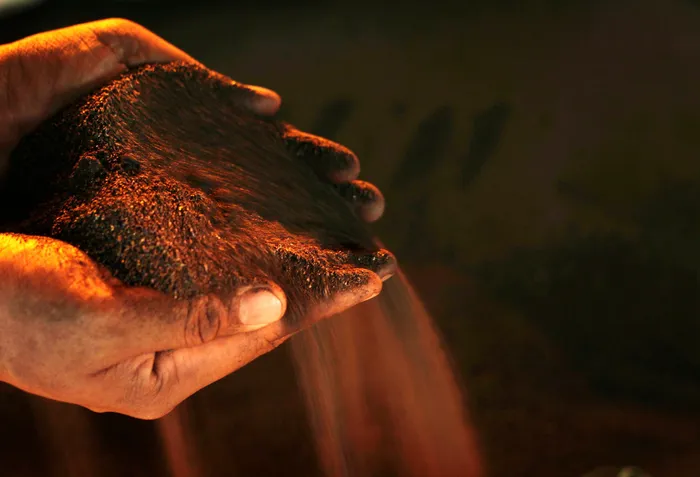
A worker poses with a handful of nickel ore. These minerals are indispensable to the production of electric vehicles, batteries, renewable energy systems, and hydrogen technologies, making them central not only to climate action but also to economic transformation
Image: Reuters
By Lebogang Mulaisi
As the global race toward a low-carbon future accelerates, the country’s rich endowment of critical minerals—such as platinum group metals, manganese, vanadium, nickel, and rare earth elements—has positioned it as a strategic player in the global green economy.
These minerals are indispensable to the production of electric vehicles, batteries, renewable energy systems, and hydrogen technologies, making them central not only to climate action but also to economic transformation. As governments and industries worldwide compete to secure supply chains, South Africa must seize this moment to ensure its critical minerals power a future rooted in justice, sustainability, and inclusive growth at home.
However, like all extractive industries critical minerals come with environmental, social, economic, geopolitical, trade, and partnership challenges and opportunities.
If poorly managed, the production and processing of these minerals can lead to a myriad of negative consequences, including significant greenhouse gas emissions arising from energy-intensive mining and processing activities, environmental impacts, including biodiversity loss and pollution, and social impacts including human rights abuses such as child labour and negative impacts on indigenous people’s rights.
In addition, there is a supply challenge which could slow down the energy transition or make it more expensive and unequal. This is leading to rising geopolitical tensions over their control, interference in markets, and strong political pressure to expand mining, including into environmentally and socially sensitive areas.
To address the intricate balance between supply and demand, sustainability and resilience must underpin every stage of the critical mineral’s economy. Extractive industries must adopt climate-resilient, low-impact technologies.
South Africa’s mineral wealth could be the cornerstone of a new growth paradigm.
Last week, cabinet approved the Critical Minerals Strategy for South Africa, which aims to maximise the potential in the global market of critical minerals, particularly those crucial for the just energy transition plan and further recognises the importance of collaboration with other countries to develop the potential of South Africa’s critical minerals sector.
Key pillars of the are on (1) exploration and beneficiation; (2) investment promotion; (3) localisation of value chains; (4) streamlining regulations, (5) fostering innovation in mining technologies; (6) building workforce skills; (7) improving transport and coordination infrastructure.
But the critical question is not just whether we will grow, but how we will grow—and who will benefit.
South Africa’s critical minerals must not simply power electric cars in Europe and Asia. They must power a future of justice, dignity, and shared prosperity at home. We have the opportunity to show the world that the green economy can be different from the extractive economies of the past—that it can be feminist, equitable, sustainable, and resilient.
If we are serious about a just transition, the critical minerals value chain cannot simply be extractive in nature while leaving behind deepened poverty, environmental degradation, and exclusion at home.
Central to this is gender inclusion, a principle too often neglected in mining and energy sectors. Historically, women have been systematically excluded from decision-making, ownership, and skilled employment in these industries. We must dismantle the structures that have kept women at the margins. This means setting enforceable targets for women’s participation in mining, refining, innovation, and leadership across the minerals value chain.
It means investing in technical training for women and girls, financing women-led enterprises in critical minerals sectors, and ensuring that social investment initiatives explicitly address women’s needs. It demands that women be active participants in community consultations, project governance, and benefit-sharing arrangements—not passive recipients of policies designed without their voices.
In 2023 at COP 28 in Dubai UN Secretary General announced the establishment of Panel on Critical Energy Transition Minerals, which will bring together governments, international organizations, industry, and civil society to develop common and voluntary principles to guide extractive industries in the years ahead. In his speech he said: “We cannot repeat the mistakes of the past,” with a systematic exploitation of developing countries reduced to the production of basic raw materials.
Economic benefits must be equitably distributed, ensuring that mining towns, rural communities, and workers gain long-term advantages, not just short-term gains for corporations. The critical mineral boom is an opportunity for our commodity-rich communities to be transformed but it can only happen if communities affected by mining are supported with ecological restoration, alternative livelihoods, and robust social protection systems.
Participation is non-negotiable. The Just Transition Framework demands that those most affected by change—workers, communities, young people, indigenous peoples—must have a seat at the table, shaping South Africa’s energy and minerals future. Their knowledge, aspirations, and rights must drive decision-making at every level.

Lebogang Mulaisi is the executive for policy and research at the Presential Climate Commission, and is previous PCC Commissioner representing Cosatu.
Image: Supplied
* Lebogang Mulaisi is the executive for policy and research at the Presential Climate Commission, and is previous PCC Commissioner representing Cosatu.
** The views expressed do not necessarily reflect the views of IOL or Independent Media.
Visit: www.businessreport.co.za